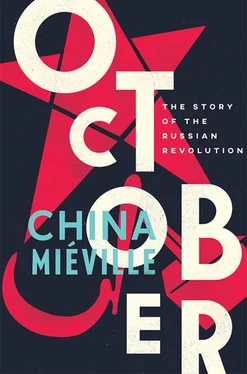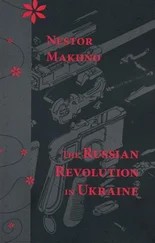This theory of ‘uneven and combined development’ suggests the possibility of a ‘leap’, a skipping of those ‘stages’ – perhaps autocratic order might be sundered without the mediation of bourgeois rule. Reconfiguring a term from Marx and Engels, Trotsky invokes ‘Permanent Revolution’. He is not the only leftist to use the term – he draws on an unorthodox Belarussian Marxist, Alexander Helphand (‘Parvus’) and others are developing similar concepts – but he will become the most celebrated one so to do, and he develops it in particular important ways.
In a ‘backward’ country like Russia, Trotsky says, where the bourgeoisie is weak, it will not execute a bourgeois revolution, which leaves the working class to do the job. But how can that working class self-stall its demands? Its triumph will be driven by its interests, eroding capitalist property and going beyond ‘bourgeois’ gains. By now, he is not the only Marxist to hold that if the working class is at the helm of this ‘permanent’ revolution it must continue beyond capitalism, but far from seeing that as a potential or likely disaster like many others, he is the most enthusiastic about the prospect. Still, for Trotsky as for most of the Russian Marxists, the international dimension is key. ‘Without the direct state support of the European proletariat’, he writes immediately after 1905, ‘the working class of Russia cannot remain in power and convert its temporary domination into a lasting socialistic dictatorship.’
In these bleak post-1905 days, some Mensheviks have shifted on the possible necessity of the party entering government, ‘against its will’ and without optimism about its prospects, if no appropriate historical agent arises. They continue to hold that the working class should ally with the liberal bourgeoisie they still see as key, and hunt for suitable bourgeois radicals who, even if ‘subjectively’ anti-revolutionary, Martynov says, contribute ‘objectively, without wishing to do so’, to the revolution. To their left, the Bolsheviks advocate instead a ‘democratic dictatorship of workers and peasants’. Both sides see that ‘progressive’ bourgeois–democratic revolution as desirable, an aspiration at the limits of the possible and sustainable. To most, Trotsky’s ‘permanent revolution’ is a scandalous eccentricity.
It is May 1912 in Irkutsk, Siberia. The workers in a vast, British-funded goldfield, housed in serf-like conditions in unsanitary barracks, have gone out on strike. They want increased pay, the dismissal of hated supervisors and – again that copula of economic and political demands – the eight-hour day. Troops are deployed. The company gives orders. The troops open fire. The death toll is 270 strikers, in what becomes known as the Lena Massacre.
Huge and angry sympathy strikes shake Moscow and St Petersburg. Industrial action picks up again. In 1914, there is a general strike in the capital, one serious enough to raise concerns about mobilisation for the war that everyone knows is coming, spawned by the predatory tussles of the great powers.
Some in the regime understand that it cannot sustain a conflict, or survive the inevitable fallout. In February 1914, in a prescient memo, the conservative statesman Pyotr Durnovo warns the tsar that if the war goes badly, there will be revolution. He is ignored. Pro- and anti-German factions vie within the elites, but Russia’s easterly interests, its alliance with and economic ties to France, necessarily range it against Germany. With some reluctance, after an exchange of urgent, polite telegrams between ‘Nicky’ and ‘Willy’ – Nicholas II and Germany’s Wilhelm II – wherein they discourage each other’s military momentum, shortly after European hostilities start, on 15 July 1914, Nicholas takes Russia into the war.
What comes then is the usual wave of patriotism and pieties, rallying the credulous, the desperate and the politically bankrupt. ‘Everyone’, reports the poet Zinaida Gippius, ‘has gone out of their minds.’ Demonstrators attack German shops. In St Petersburg, a crowd clamber onto the roof of the German embassy and throw down its pair of enormous equine sculptures. They land twisted and wrenched, with macabre bronze injuries. Russians cursed with German names rush to alter them. In August 1914, the name of St Petersburg itself is changed to the more Slavonic Petrograd: in semiotic rebellion against this idiocy, the local Bolsheviks continue to style themselves the ‘Petersburg Committee’.
To the north-east of the city centre, in Petrograd’s great domed Tauride Palace, on 26 July 1914, the Duma deputies vote in favour of war credits, the state’s borrowing to fund the carnage. Liberals now pledge themselves again to the sclerotic regime the modernisation of which is their notional raison d’être . ‘We demand nothing’, simpers Milyukov, ‘and impose no conditions.’
It is not only the right who line up for war. The peasant–populist Trudoviks, a moderate left party associated with the SRs, enjoin peasants and workers, in the words of their mouthpiece, a flamboyant lawyer named Alexander Kerensky, to ‘defend our country and then set it free’. The celebrated anarchist Prince Kropotkin himself supports the fighting. The SRs are split: though many activists, including Chernov, oppose the slaughter, a large number of the party’s leading intelligentsia support the country’s war effort – including the near-legendary SR figurehead Babushka, the ‘Grandmother of the Revolution’, Catherine Breskho-Breshkovskaya. Nor is the Marxist left immune. Grotesquely, the venerable Plekhanov tells Angelica Balabanoff of the Italian Socialist Party: ‘If I were not old and sick I would join the army. To bayonet your German comrades would give me great pleasure.’
All across Europe, Marxist parties in the organisation of socialist and labour groupings known as the Second Socialist International break with previous pledges and rally to their governments’ war efforts. The moves shock and devastate the few stalwart internationalists. On hearing of the pro-war vote of the powerful German Social Democratic Party, Lenin clings desperately, for the short while that he can, to the belief that such reports are a forgery. The great Polish-German revolutionary Rosa Luxemburg considers suicide.
Within the Duma, only the Bolsheviks and Mensheviks walk out against the war. For this show of principle, many deputies will find themselves exiled to Siberia. When Plekhanov visits Lausanne to argue for the military defence of Russia, a pale, raging, familiar figure comes to confront him. Lenin will not call him comrade, will not shake his hand. Lenin damns his old collaborator with remorseless cold invective.
Russia mobilises more quickly than the Germans expect, invading East Prussia in August 1914, aiding France’s early battles. But the country’s armed forces, albeit somewhat modernised since 1904, are still in a parlous state. And the Russian high command is totally unprepared for modern war. Its commitment to nineteenth-century methods in an era of rapid-firing war machines leads to appalling carnage. As supply problems, incompetent leadership, corporal punishment and the infernal nature of the fighting take their toll, the war effort is undermined by waves of surrenders, disobedience and desertions.
The German offensive comes in the spring of 1915. Under the barrage Russia loses significant amounts of territory, almost a million soldiers are captured, and more than 1,400,000 killed. The scale of the cataclysm is giddying. Ultimately the war will cost Russia between 2 and 3 million lives – perhaps more.
In September, the tiny Swiss village of Zimmerwald hosts a conference of European anti-war socialists. A pitiful thirty-eight delegates, including Bolsheviks and internationalist Mensheviks and SRs.
Читать дальше











